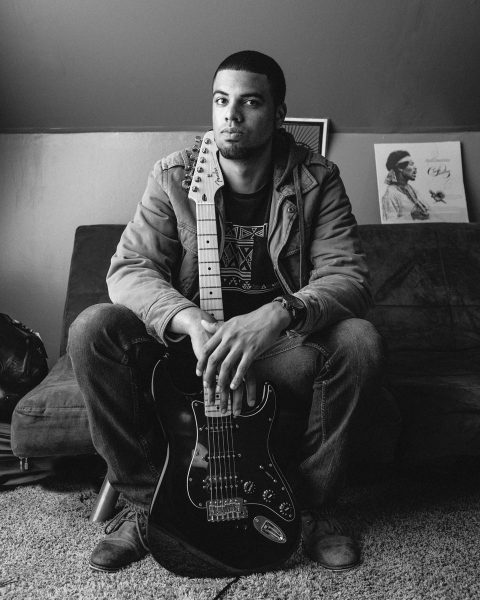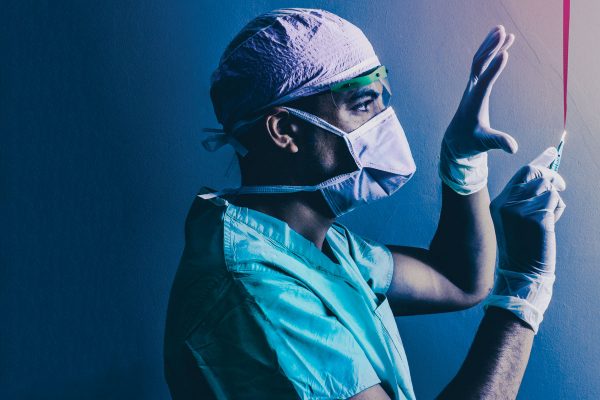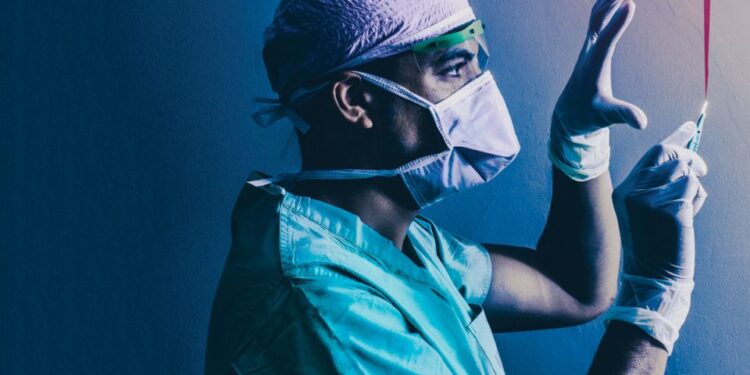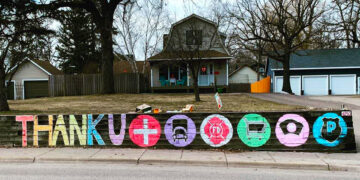Sebastian Lane, at just 2 years old, strummed on the clear nylon strings of a plastic yellow guitar. At age 3, a naked Lane head-banged atop his toy chest, curly black hair whipping around his face as he jammed on his guitar while “Hey Joe” by Jimi Hendrix played on the stereo. Eyes scrunched and head down, he mastered his “guitar face.”
Two years later, clutching that same toy guitar, Lane waited until his father lifted him so he could peer into a coffin. He rested the guitar and a note next to his grandfather’s body.
Miss you. Thanks for the guitar.
 Lane’s grandfather, Jimmy Rogers, died from colon cancer in 1997. In his career, Rogers had electrified old Chicago blues. His old-style boogie beat influenced legends like Eric Clapton, Keith Richards, and Jimmy Page. Lane remembers him as a larger-than-life figure who laughed, cuddled, and talkedrto him.
Lane’s grandfather, Jimmy Rogers, died from colon cancer in 1997. In his career, Rogers had electrified old Chicago blues. His old-style boogie beat influenced legends like Eric Clapton, Keith Richards, and Jimmy Page. Lane remembers him as a larger-than-life figure who laughed, cuddled, and talkedrto him.
But in that moment, next to the casket, a dualistic passion sparked into Lane’s life—blues and medicine.
He grew up on the South Side of Chicago. He ran around eating gumbo while blues masters such as Lazy Lester, Buddy Guy, and Muddy Waters visited his father, Jimmy D. Lane, and grandpa.
Lane’s father, Jimmy D. (himself a Blues Hall of Famer), continued Jimmy Rogers’ legacy, picking up the guitar to jam with musical geniuses: Mick Jagger, B.B. King, Van Morrison, and a host of others.
“Music is hard. It can be a long life of struggle,” says Jimmy D.
Growing up, Lane knew his father’s struggle. A good show, or a dry spell without gigs, could mean Lane and his younger brother were either wearing new clothes or depending on hand-me-downs.
When an opportunity came to be a musical director at Blue Heaven Studios in Salina, Kansas, Jimmy D. moved the family away from the mean streets of Chicago.
“My father basically said, ‘I choose you and your brother over being famous,’” Lane says. “And I’m so grateful for that.”
Jimmy D. never pushed his sons into the business. Lane picked up guitar playing on his own, practicing the same song for hours and hours until he could pick up patterns. He messed around with bars and chords. Jimmy D. showed his son some licks, but Lane’s skills came from a good ear.
Bash, as his friends like to call him, was well into learning the guitar by fifth grade. He won a talent show for “Sweet Child of Mine,” in a Slash rendition on the electric guitar. His tone soon became a mix of upbeat blues and nasty rock.
His fascination with medicine lingered. Ever since his grandfather’s passing, Lane wanted to understand how cancer spread, how it worked, and how it could be cured.
During a job shadow his senior year of high school, Lane saw an interventional cardiologist inject contrast that showed coronary arteries on a live X-ray. “Wow, that’s so cool,” he thought.
Lane decided to major in pre-med at Hastings College. He was the first in his family to attend college, and he wanted to become a cardiothoracic surgeon. School wasn’t easy, and Lane had to work four jobs while studying and playing music on the side. He bartended, worked for a telefund, did shows on weekends, taught guitar lessons, and started a band called Ambur Lane.
After taking his MCATs, Lane stayed in Nebraska and is now a second-year medical student at the University of Nebraska Medical Center. Lane says the program is the most difficult and time-consuming thing he’s ever done.
Yet he finds time for community and musical commitments. He’s a mentor for diversity awareness. “It is important to open people’s eyes to at least represent the dynamics of a population,” he says. And he still dedicates an hour or two to music each day, sometimes more. “It’s a struggle to balance your love and passion with playing guitar and medicine,” he says.
There is a complementary duality to his musical and medical passions. His nimble fingers fly over the maple neck of his Fender American Standard Stratocaster, and they move just as rapidly when throwing sutures.
In spring of 2015, Lane worked in Los Angeles with Capitol Records for various artists, which allowed him to interact with creative individuals who “got him.” In medical school, the situation is similar in his conversations with like-minded intellectuals.
“Would I be happy playing music every day? Hell, yeah. Would I be happy practicing medicine every day? Hell, yeah,” Lane says, brown eyes suddenly wide and serious.
Music gives Lane a chance to de-stress and keeps his mind clear. In addition, Lane believes music, like medicine, heals.
When he finds time, Lane will play with his `90s cover band, 22 Days Short. His biggest love, however, is still the blues. When he is with the Sebastian Lane Band, he can be himself.
Like the old masters in Memphis and Chicago playing in dark corners of hole-in-the wall bars, Lane often showcases his blues at The 21st Saloon at 4727 S. 96th St.
“With blues, no rules, you know. It’s authentic. It’s in my DNA. It’s who I truly am,” Lane says.
He hopes someday to play with the big dogs.
Can Lane out-shred the old man?
“He’d like to believe he could,” Jimmy D. says, laughing.
rhttps://www.youtube.com/watch?v=XQnubMoHg3Mr
Visit facebook.com/sebastianlanemusic for more information. Omaha Magazine.














